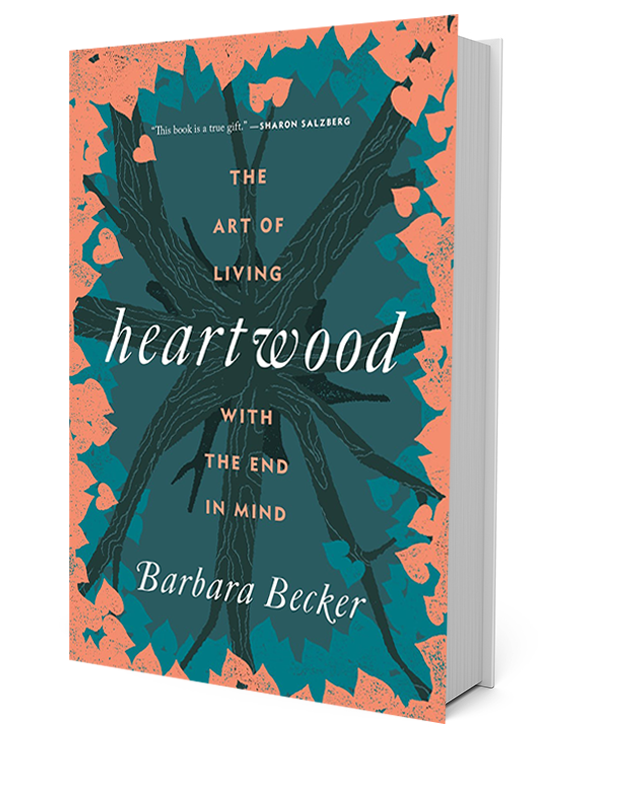Home > Resources > Barbara Becker | Heartwood: The Art of Living with the End in Mind
Heartwood: The Art of Living with the End in Mind
by Barbara Becker
Author Barbara Becker—a perpetual seeker, a mom, and an interfaith leader—recounts stories where life and death intersect in unexpected ways. She volunteers on a hospice floor, becomes an eager student of the many ways people find meaning at the end of life, and accompanies her parents in their final days. With life-affirming prose, Becker helps us see that grief is not a problem to be solved, but rather a sacred invitation. Below is an excerpt from chapter 12 of Heartwood: The Art of Living With the End in Mind (Flatiron Books, 2021).
Excerpt
Mr. R was lying in a fetal position, facing the door. Even though he was covered with a sheet, I could tell that his frame was tall and skeletal. And he was shaking uncontrollably.
I dragged the heavy beige upholstered chair closer to the side of his bed and sat on its arm.
“Mr. R, my name is Barbara.” No response. “If it’s okay with you, I thought I would just sit here with you for a while.”
His shaking was unnerving. I could almost feel my own brain rattling in my skull as I watched his body convulse. I leaned in closer to his bed and impulsively began humming, every bit as much to soothe myself as to soothe him.
When my own song was finished, I heard another verse from my memory. Faintly at first, La ilaha illallah—the Arabic incantation the Sufis had repeated over and over during their gathering—formed in my ears. They were the same words I had heard echo through the alleys of Dhaka while I was working in Bangladesh, and everywhere we had traveled in Turkey, as part
of the prayer called from minarets five times each day.
I leaned closer to Mr. R and from the depths of my heart whispered the sacred words: La ilaha illallah. Nothing, only this.
After several rounds of repetition, I began to wonder about him. What was the cause of his shaking? Where was his family? Did it matter, when no one else was available, that I wasn’t Muslim? The beauty of the ancient phrase drowned my questions before I could formulate my guesses. None of the answers seemed worthy of this moment. La ilaha illallah.
Eventually I noticed that Mr. R’s shaking had stopped. When I moved away from the bed, his body began to convulse wildly again, so I continued with the rhythm. La ilaha illallah. La ilaha illallah. I hadn’t expected the chant to affect me as much as it did. He stopped being the unwell person and I the well one. The one in need of help and the helper. He a man, I a woman. He older, I younger. What could possibly be the use of divisions like that?
An hour and a half must have passed. I had to leave to go to work. His eyes were still closed, and he was still not responsive. But I told him how sorry I was to have to leave anyhow. As his shaking began again, I backed out of the room very slowly, not wanting to turn away from him for even a moment. It was wrenching to leave him this way.
When I switched on my computer at my desk an hour later, I was surprised to see an email from the volunteer whose shift followed mine:
I hope you are well! I wanted to tell you that when I came onto the floor, I saw the note you had written about a patient—that you stayed with him for a long time, humming. I wanted to let you know that when I saw that note I went to go see him, and it seemed he had passed just before I got there. So you were there just before he died, you’re the last person he was with. I’m sure it was so helpful for him to be with you and maybe you helped him to let go.
Anyway, I thought I’d let you know because sometimes I find it’s not so clear what’s happened to a patient when they’re not there the next week, and it seemed like you had a connection with him.
I leaned back in my chair, overwhelmed with emotion. My connection with Mr. R had been so short, but the length of our meeting had hardly mattered. There seemed to be a place beyond time, and we had met there with offerings to each other. His had been a tremendous gift of illuminating our interconnectedness, and all I wanted to do was to thank him for allowing me to join him for a while. I opened the window by my desk, turned my face into the cool breeze, and breathed his name.
For more information visit www.barbarabecker.com
Bio: Barbara Becker is a writer and ordained interfaith minister who has dedicated more than 25 years to partnering with human rights advocates around the world in pursuit of peace and interreligious understanding. She has worked with the United Nations, Human Rights First, the Ms. Foundation for Women, and the Grameen Bank of Bangladesh, and has participated in a delegation of Zen Peacemakers and Lakota elders in the sacred Black Hills of South Dakota. She has sat with hundreds of people at the end of their lives and views each as a teacher. Through writing, she explores what it means to live a life of meaning. Barbara lives in New York City with her interfaith family. Read reviews and purchase a copy of the book here.
SOCIAL MEDIA
Facebook // Instagram // Good Reads

